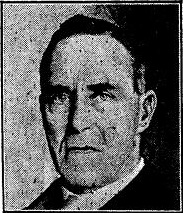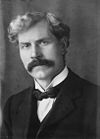Josiah Wedgwood, 1st Baron Wedgwood
J. C. C. Davidson | |
|---|---|
| Succeeded by | The Viscount Cecil of Chelwood |
| Personal details | |
| Born | 16 March 1872 |
| Died | 26 July 1943 (aged 71) |
Background
Josiah Wedgwood was born at
He
- Helen Bowen Wedgwood (1895–1981), married the geneticist Edward Reynolds Pease. One of their sons was the physicist Bas Pease and one of their daughters, Jocelyn Richenda Gammell Pease (1925–2003), married Andrew Huxley, the biologist.
- Rosamund Wedgwood (1896–1960)
- Francis Charles Bowen Wedgwood(1898–1959), 2nd Baron Wedgwood. He was father of the 3rd Baron.
- Josiah Wedgwood V (1899–1968), managing director of Wedgwood. He was father of Dr John Wedgwood (1919–2007), former heir presumptive to the barony.
- Camilla Hildegarde Wedgwood (1901–1955), anthropologist
- Elizabeth Julia Wedgwood (1907–1993)
- Gloria Wedgwood (1909–1974)
In 1919 he remarried; his second wife was Florence Ethel Willett (1878–1969).
Military and political career

His mother's family was involved both financially and in the management of Elswick Shipyards and Armstrongs Armament manufacturers in Newcastle upon Tyne. Josiah was sent to the Royal Naval College, Greenwich to study Naval Architecture before going to work at Elswick.
He worked for a year from 1895 as an Assistant Naval Constructor in Portsmouth before returning to Newcastle-upon-Tyne to head Armstrong's drawing office.
In 1891, he was commissioned in the
Having returned to
World War I
Following the outbreak of the
Promoted to Major he commanded a machine gun company in the 2nd South African Infantry Brigade in 1916. In 1917 he became Assistant Director of Trench Warfare with the rank of colonel. At the start of 1918 he was sent to
1918 General Election
In the
Joining Labour
In 1919, Wedgwood took the
Cabinet and the Lords

There was tacit co-operation between Labour and the opposition Liberals in some seats at the
He chaired a Cabinet Committee to contemplate the use of the Emergency Powers Act against strikes in the transport industry. He took a strong line on a number of issues, opposing disarmament and the promise of a loan to the Soviet Union. He was also wary of the state undertaking public works purely for the sake of doing so, without any utilitarian benefit.
After the fall of the government, Wedgwood publicly criticised MacDonald's leadership and Labour's reliance on civil servants. He sat on Labour's front bench in opposition, speaking on, amongst other policy areas, local government, where he encouraged
From the mid-1930s he was critical of
In the
aged 71.Zionism
Wedgwood was impressed by his contact with the
In 1942 he prefaced the booklet STOP THEM NOW, the first public report printed in English about the non-stop destruction of the Jews in German-occupied territories, in which he says : "The Huns and the Mongols,
Legacy and commemoration
- Wedgwood Memorial College, a residential college founded in Stoke-on-Trent in 1945 was named after him.[13]
- Nachal Reuven, a moshav in central Israel, was renamed Gan Yoshiya (Hebrew: גן יאשיה, lit. Josiah's Garden) in his honour.
- The Josiah Wedgwood, a 1946 Aliyah Bet ship (originally the Royal Canadian Navy corvette HMCS Beauharnois) was named after him. The ship was later part of the Israeli Navy as INS Wedgwood (K-18).
- Streets in Jerusalem, Tel Aviv and Haifa bear his name.[14]
Arms
  |
|
See also
References
- ^ "No. 26139". The London Gazette. 27 February 1891. p. 1122.
- ^ "No. 27170". The London Gazette. 2 March 1900. p. 1434.
- ^ "No. 29358". The London Gazette. 5 November 1915. p. 11029.
- ^ Greenfield, Murray S. & Hochstein, Joseph M., Jews' Secret Fleet, Gefen Publishing House, Jerusalem, 2010, p.56
- ^ The Last of the Radicals by C. V. Wedgwood
- ^ The Downfall of the Liberal Party by Trevor Wilson
- ^ "Mayors from 1900 to Present". Newcastle Borough Council. Archived from the original on 28 July 2014. Retrieved 31 July 2014.
- ^ REFUGEES. (Hansard, 6 July 1939)
- ^ "No. 35431". The London Gazette. 23 January 1942. p. 401.
- ^ Bloom, Cecil. “Josiah Wedgwood and Palestine.” Jewish Historical Studies, vol. 42, 2009, pp. 147–172. JSTOR, . Accessed 29 January 2020.
- ^ Josaih Wedgwood and the seventh dominion scheme, Joshua b. Stein
- ^ STOP THEM NOW - German mass-murder of Jews in Poland, p. 3.
- ^ Wedgwood Memorial College Archived 6 January 2009 at the Wayback Machine Barlaston Online
- ^ Robert Fulford's column about place names
- ^ Burke's genealogical and heraldic history of the peerage, baronetage, and knightage, Privy Council, and order of preference. 1949.
Further reading
- Paul Mulvey (2010) The Political Life of Josiah C. Wedgwood: Land, Liberty and Empire, 1872-1943
- J. C. Wedgwood (1940) Memoirs of a Fighting Life (autobiography)
- C.V. Wedgwood(1951) Last of the Radicals
- Joshua B. Stein (1992) Our Great Solicitor: Josiah C. Wedgwood and the Jews
- Gabriella Auspitz (2004) My Righteous Gentile: Lord Wedgwood and Other Memories Labson

